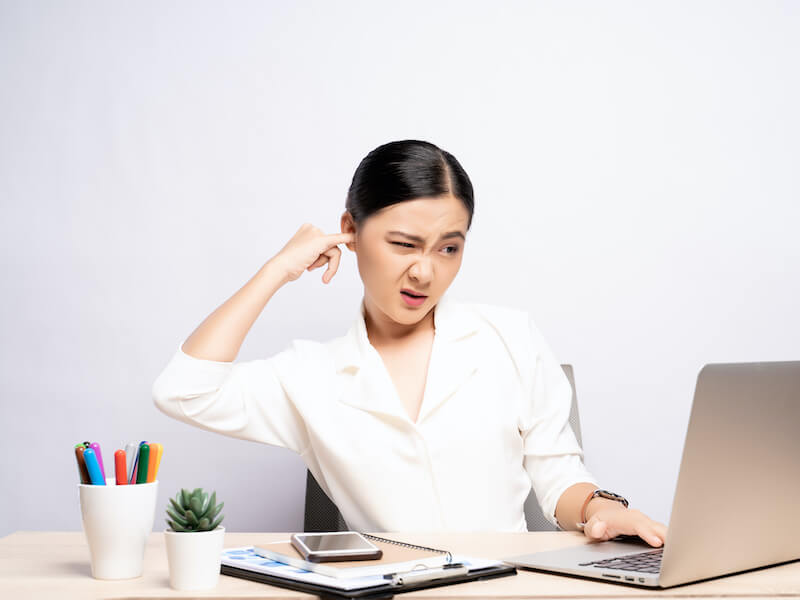
We’ve all experienced that itch that seemed impossible to scratch.
You may consider this in a couple of different ways: First, you think about something you always wanted to do with your life but you never got around to (skydiving, for instance). Or, if you’re a little less of a romantic, you think about that spot on your back that you just can’t quite scratch.
That’s kind of a terrible experience, isn’t it? Desperately attempting to scratch that itchy spot on your back. It’s the reason why back-scratchers exist.
Unfortunately, there’s no such device that can relieve itching in your ears. Regardless of how hard you try, you just can’t reach up inside your ear canal where it’s itching. If you’re ear itches like this, it’s even more frustrating than that spot on your back.
Itchy ears can impact your daily life
On the surface, it sounds like a minor thing. Itchy ears? It could be worse, right? At least you’re not in horrible pain.
Here’s something to think about: Your ear is itchy, and you can’t get any relief. If it occurs now and then, sure, it’s not that big of a deal. But if your ears are itchy all the time? You might find yourself, and your quality of life, substantially impacted.
Maybe the experience is so unpleasant that you stop eating out or seeing friends. Or perhaps you try to overpower the sensation by listening to overly loud music.
It’s not at all fun. But treatments and strategies do exist. Finding the best way to treat itchy ears means knowing what causes them in the first place.
So what causes your ears to itch?
So what’s the cause of that itch? And what’s the treatment? The solution for itchy ears is going to differ depending on the underlying cause. As with most other medical conditions, there are a number of possible underlying conditions that may be impacting your ears. Here are a few of the most common:
- You have an earwax blockage: If your ears are producing a significant amount of wax, that’s not abnormal. That’s because wax is helpful for your ears and (counter-intuitively) helps clean them! But there are several reasons why blockages can develop. One thing you should quit doing right away is using cotton swabs to “clean” your ears. We can, in any case, help you clear up any earwax difficulties. So you will get some relief by making an appointment with us.
- Skin disorders: Certain skin disorders can, at times, trigger itching that’s hard to get to. You can even end up with something called ear dandruff. You should talk to your doctor about what your solutions are. putting moisturizer in your ear isn’t a practical or safe option, after all. Once again, your doctor will be the best one to help you treat skin conditions that trigger itchy ears!
- Improper hearing aid fitting: Your hearing aids should fit in your ears snugly. This will produce the best returns and the best sound. But when your hearing aids don’t fit correctly, this snugness can quickly turn into irritation and itchiness. This, in turn, can cause you to stop wearing your hearing aids as frequently, and that can be bad for your hearing. The solution is to come in and consult us for a proper fitting. We may even be able to mold your hearing aid so it fits your ear better.
- Ear infections: Yes, the plain old ear infection may be the reason for your misery. Ear infections can arise at any age but happen more frequently when you’re younger. And when they do, fluid can accumulate in your ears. At the same time, the tissues in your ears can start to become inflamed. Extremely itchy ears can be the outcome of this trapped fluid and irritated tissue. Treating the infection with the help of your doctor is the answer. Once that’s cleared up, your ears should stop itching.
- Allergies: Allergies can frequently cause itching. In some instances, an over-the-counter allergy medication, like an antihistamine, can relieve itching caused by allergies. It can be hard to pin down, sometimes, exactly what you’re allergic to. But itchy ears can be a consequence of a large number of allergens, including pollen. So your spring hay fever could quickly translate into itchy ears. If the itching lingers, you should talk to an allergist about finding a solution (and relief).
Finding relief for your itchy ears
Pretty much every activity becomes less enjoyable with itchy ears. Finding the correct treatment, and getting lasting relief can be absolutely life changing. If you try to just wait it out, you will most likely prolong your suffering because it isn’t likely that the itching will go away on its own.
Stop paying attention to your itchy ears and get back to enjoying your life. Contact us for a consultation.
